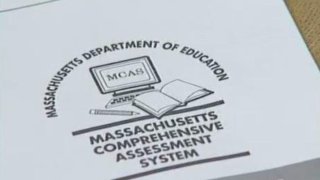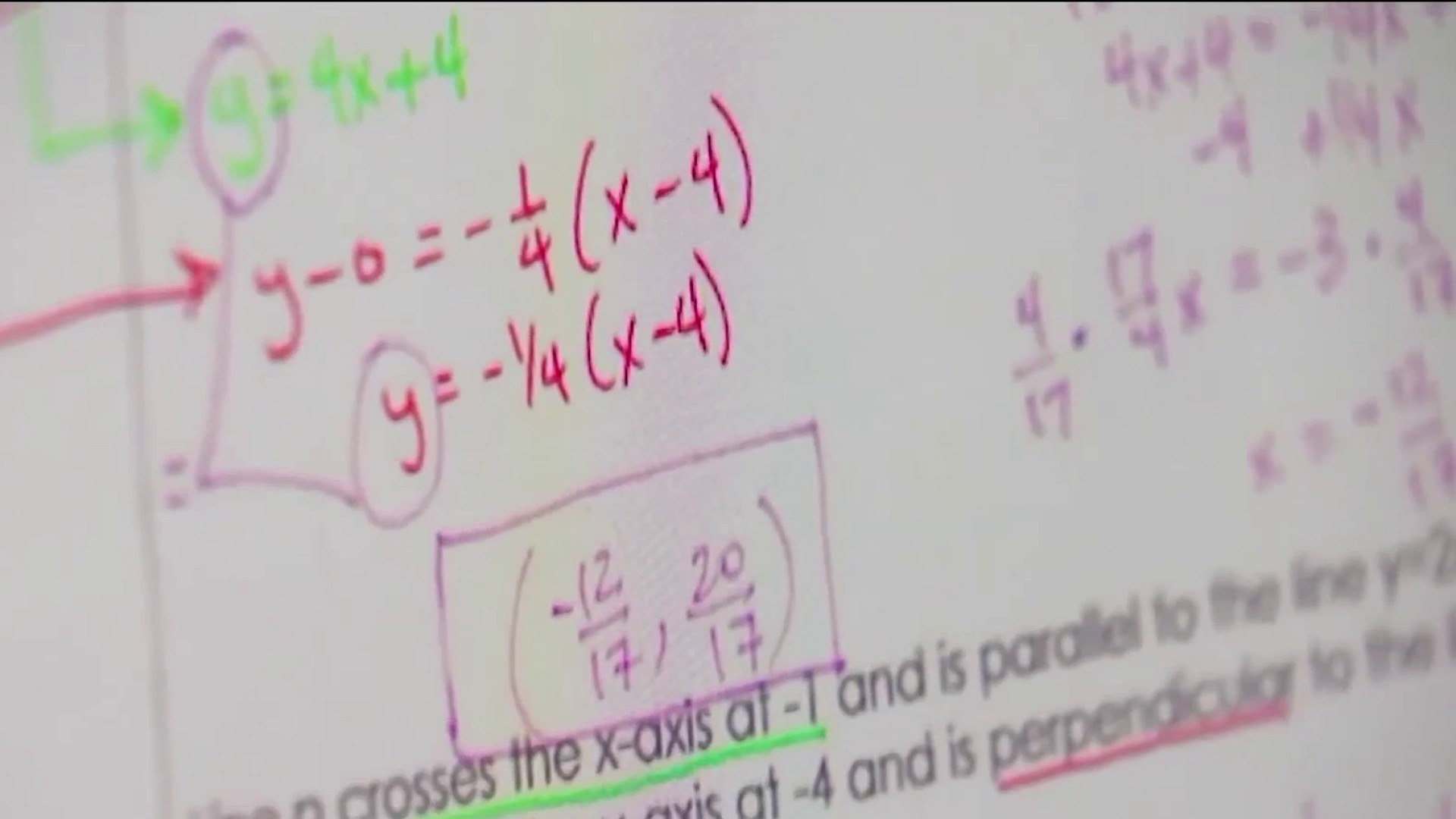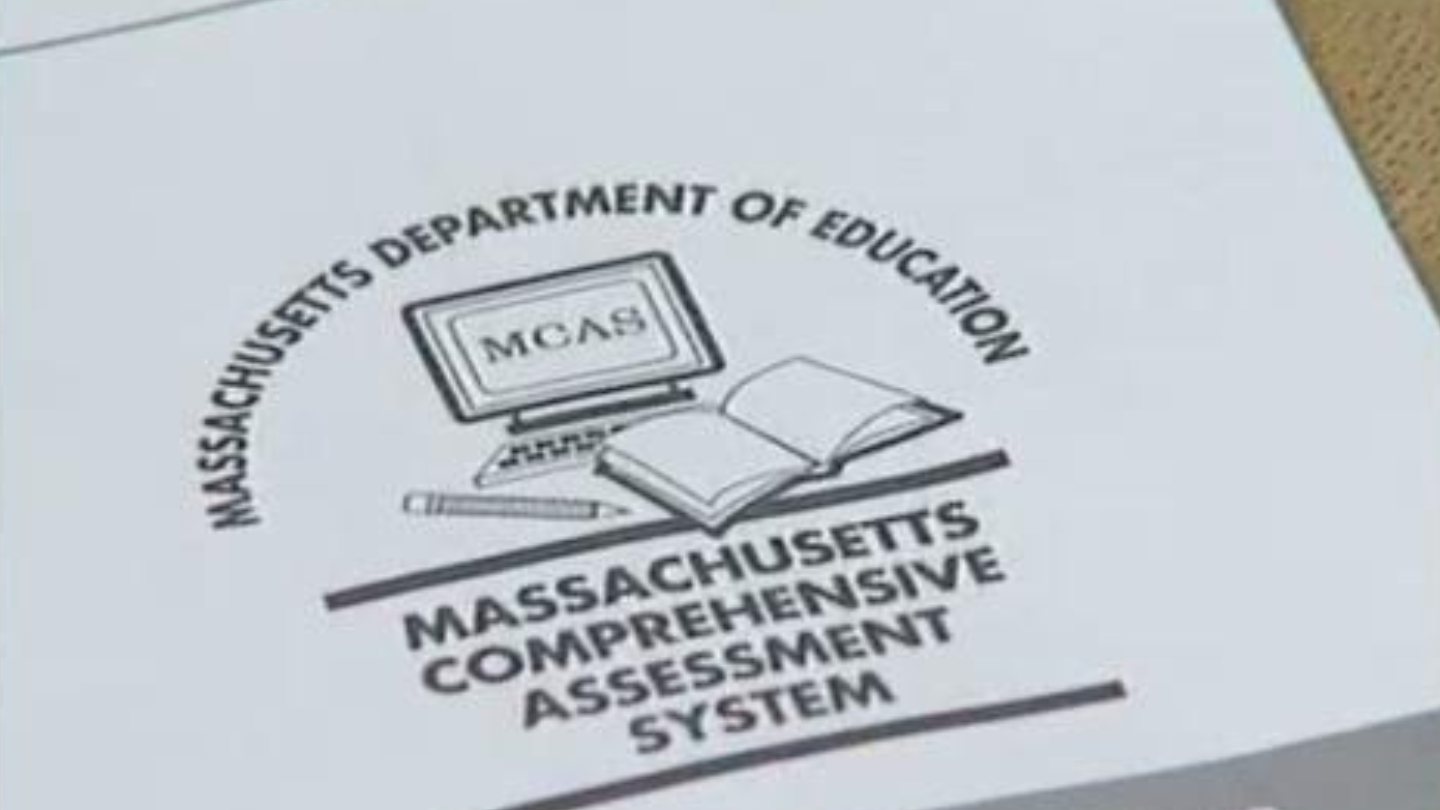
Massachusetts students are making progress in math and English language arts (ELA), 2023 test scores reveal, but they still lag behind compared to the years before the pandemic.
On Tuesday the Massachusetts Department of Elementary and Secondary Education released the 2023 Massachusetts Comprehensive Assessment System (MCAS) scores. MCAS are a standardized test administered to grades 3 -8 and high school. Tenth graders must pass the test to graduate high school.
According to the newest results, students meeting or exceeding expectations in both math and ELA increased from 2022 to 2023 in grades 3-8. At the high school level, the percentage of students remained the same.
Math
Get Boston local news, weather forecasts, lifestyle and entertainment stories to your inbox. Sign up for NBC Boston’s newsletters.
| Grade | 2022 %M/E | 2023 %M/E | Change M/E 22-23 |
| 3-8 | 39% | 41% | +2 percentage pts. |
| 10 | 50% | 50% |
ELA
| Grade | 2022 %M/E | 2023 %M/E | Change M/E 22-23 |
| 3-8 | 41% | 42% | +1 percentage pts. |
| 10 | 58% | 58% |
Scores were down in science in the lower grades, and steady at the high school level.
| Grade | 2022 %M/E | 2023 %M/E | Change M/E 22-23 |
| 5 | 43% | 42% | -1 percentage pts. |
| 8 | 42% | 41% | -1 percentage pts. |
| High School | 47% | 47% |
These numbers are still down from 2019, when 52% of students in grades 3-8 met or exceeded expectations in ELA, 49% in math and 48% in science. In grade 10 in 2019, 61% of students met or exceeded expectations in ELA and 59% in math.
“Pandemic learning loss is a national problem, but these results show signs of recovery thanks to the hard work of educators, students, families, and staff,” said Education Secretary Patrick A. Tutwiler. “We know there is still much to be done, and we will continue to improve and strengthen our schools until every student can access the supports and resources they need to succeed.”
When the pandemic hit in 2020, the state did not administer MCAS testing at all. In 2021, they did half tests in the lower grades and full testing at the high school level. In 2022 and 2023, schools returned to a full testing schedule.
However, there is a push to remove MCAS requirements altogether.
About 700 students every year leave high school without a diploma, who otherwise would have received one, because they failed to pass Massachusetts' required standardized test.
Of approximately 70,000 students in each graduating class, 96% meet the state's "competency determination" associated with the MCAS, according to data compiled by Board of Elementary and Secondary Education Vice-Chair Matt Hills, who presented his findings at the board's meeting on Tuesday.
Of the 4% of students who don't pass the test -- and therefore cannot earn a diploma -- three-quarters already don't meet local district requirements to be eligible for graduation, according to data in Hills' presentation provided by Department of Elementary and Secondary Education Associate Commissioner Rob Curtin.
Hills said he has been working on the MCAS overview since the board controversially voted last year to raise the minimum score students have to attain to graduate starting with the class of 2026. Though he said the presentation's timing is not a response to a potential ballot question to remove the testing graduation requirement, it comes against the backdrop of an escalating debate about the role of the test in determining students' eligibility for a diploma.
The Massachusetts Teachers Association, the state's largest teachers' union, backs an initiative that would eliminate the requirement that students pass the MCAS to graduate high school, and instead would require that students complete coursework certified by their district. If supporters can collect enough signatures, the question could appear before voters on the 2024 ballot.
The MCAS exams were created under a 1993 education reform law aimed at improving accountability and school performance. The first tests were given in 1998, and high school students have been required to pass the tests to graduate since 2003.
A common criticism of the competency determination is that it prevents otherwise eligible students from earning a high school diploma.
"My focus," Hills said, "is not, 'Ah -- it's just 700 students, who cares?' It's 'What programs do we need to put in place at the state level to partner with districts so that 700 gets as close to zero as possible?'"
The estimated 700 students who fail the exam but otherwise meet district requirements earn a "certificate of attainment" as opposed to a diploma. This certificate is not accepted by Massachusetts' public colleges and universities, Hills said.
"Is someone who's hiring a high school graduate going to say, 'I'm sorry, you only have a CA, you don't have the diploma.' I doubt it," Hills said. "I will say there is no question -- I don't want to give the impression that the 1% with the certificate of attainment are, that it's basically the same thing as a high school diploma. It's not. At least in terms of applying for public colleges and universities here."
Students who do not pass the test in 10th grade often take it again as a junior, and may take it several times.
Close to 95% of Asian and white students pass the competency determination on their first try, compared to just over 80% of Black students and just under 80% of Hispanic students, according to Hills' presentation.
Economically disadvantaged, or low-income, kids pass on the first attempt close to 80% of the time. Students with specialized education needs pass on their first try close to 70% of the time, and English language learners on average require the most tries to pass. Less than half pass on their first try, but close to 95% passing by their fourth-plus attempt.
Overall, close to 95% of all students earn the competency determination by their second attempt.
"If you look at each student group, just to see are there racial and ethnic disparities, you see slightly lower numbers for certain racial and ethnic groups, Black and Hispanic, but still very, very high overall numbers," Hills said in an interview with the News Service.
If a student has not passed the test, districts can develop something called an Education Proficiency Plan for that individual.
Katherine Craven, chair of the education board, said her son passed the competency determination using an alternative method.
"It's very infrequently discussed, but there are all sorts of chances to pass the MCAS and there are alternatives that districts can use. Something like 20% of students don't pass the MCAS at all through the state, they use EPPs," she said.
Craven explained that a student who fails to meet a proficient level on the exam gets an EPP, which reviews the student's strengths and weaknesses based on MCAS scores, coursework, grades and teacher input. It's a process through which districts can help students reach the competency determination without necessarily passing the traditional test, or using a modified approach, contributing to the 96% of students who graduate with the diploma requirement.
Students can also appeal to the department if they are "just a bad test taker," Hills said. He added that 75% of appeals get approved.
"This is not an IQ test. It is a test of whether or not you learned basic curricular matters, frameworks, that have been in place statewide for 30 years. We're measuring learning outcomes, not if you've learned how to take a test like the SAT or ACT," Craven said.
Hills said there is a "policy implication" for English language learners, who on average pass the test less than any other demographic that Curtin's data tracks.
The Newton board member said EL students on average outperform state grade averages about three or four years after they first come to the United States.
"If someone has immigrated to America in Grade 9 and we're testing them in Grade 10... they're not going to do that well. Why should they? They may be coming here from a place where they don't speak English at all, even as a second language, fleeing poverty, war and famine," Hills said. "But we know they will do well, at least certain EL students, once they've been here a few years. I think that's a very legitimate policy question. What can we do?"
Craven said the department currently has a pending request for proposals to reevaluate the test, and that they are "open to a new way of looking at the evaluation" and "finding a way to modernize it."
For example, the department is looking at providing translated versions of the assessments in additional grades and additional languages, Curtin said at Tuesday's board meeting. The tests are currently offered in Spanish for math and science at the high school level, and DESE has proposed both to offer Spanish exams in third through eighth grade and also to offer tests in languages other than English and Spanish.
The department also plans to move toward replacing current science tests in fifth and eighth grade with a new science assessment focused on the "doing of science," where students would do lab work, Curtin said. Officials also hope to improve turnaround times for exam scores by using artificial intelligence to grade some parts of the test, plus reduce the total testing time by decreasing the number of essays students are asked to write.
A common criticism of the MCAS exams is that they take up instructional time that could be spent in the classroom. Curtin said average testing time in third through eighth grade is around seven hours for the ELA and math sections, combined, and nine hours in the grades where students also take a science section.
He added that the department is also considering adding a civics assessment in eighth grade, which would launch in fiscal year 2025.
Although the department is examining ways to change the test, Craven said that eliminating the MCAS altogether -- as some have called for -- would eliminate a standardized tool for the state to measure equity across districts and student demographic groups.
Students who are not reaching the competency determination tend to be concentrated in certain districts, with 15 districts accounting for half of all students who don't pass the 10th grade MCAS.
Of the students in these districts, 72% do not meet district requirements. Within the other 28% -- who have a certificate of attainment and otherwise would have gotten a diploma -- 80% are concentrated in nine districts.
The 15 districts that contain 50% of all Massachusetts students not passing the exam are Methuen, Fitchburg, Holyoke, Leominster, Boston Day, Everett, Lowell, New Bedford, Lawrence, Fall River, Lynn, Worcester, Brockton, Springfield and Boston. Boston schools have the highest percentage of those not earning the competency determination, at 18.2%.
"One argument against having an MCAS is that MCAS doesn't predict anything different than income or poverty do," Craven said. "But that's not true. Because there are districts that have done exceedingly well and others that haven't, that are in the same income line."
Many of the districts included in the 15 that contain half of students failing the competency determination serve lower-income students and large populations of English learners.
Research by Professor John Papay of Brown University, cited in Hills' analysis, shows that students with higher MCAS scores go on to earn substantially more in the labor market. This is true across different racial and ethnic groups.
The Grade 10 MCAS scores can help predict earnings among similar students with the same education level and demographics, Papay found.
Asked why, from a policymaking perspective, it is valuable to have data that predicts earnings, Hills responded that "it shows we have a test that's accurately predicting future income," and that "we need to put our resources and initiatives behind improving scores when a student gets into high school in order to give them a real chance at an adequate income, or enrolling in a two- or four-year college."
The data shows the likelihood of enrolling and graduating from college increases for students with higher MCAS scores. Among students who took the 2011 math test, only 24% who earned a proficient/needs improvement score graduated from a two- or four-year college, compared to a 48% statewide average.
"There's an argument being made that the data doesn't matter and we should eliminate the headache," Craven said. "But we see that it matters because the statistics show that your ability to earn a living wage later in life correlates with your ability to pass [the competency determination] by 12th grade or not."
Hills also said the exam is Massachusetts' only comprehensive statewide graduation requirement.
Including Washington, D.C., 49 other states have "comprehensive course requirements" for students to graduate, Hills said. These include mandating that students acquire a certain number of course credits across subjects, or pass core-curriculum or civics tests in different states.
In comparison, Massachusetts' only comprehensive statewide requirement is the MCAS, Hills said, allowing local districts more control over their curriculum.
"All 48 other than Massachusetts, of the 49, have a series of comprehensive course requirements. I don't mean you have to pass P.E. -- serious course requirements. We're the only one with extreme local control," he said. "It's like, you guys figure out the courses, we're offering frameworks -- but that's guidance, that's not mandatory. We're the only ones whose sole graduation requirement is a test."
Craven also said the MCAS is the only statewide tool to measure student learning.
"With the 1993 education reform law the state embarked upon a radically higher amount of state support for districts. We didn't tell you you had to have a certain amount of teachers in the classroom, or books in the library. School committees can spend state money however they want to. But we have the test, and that's the only measurement of progress that we have," she said.



